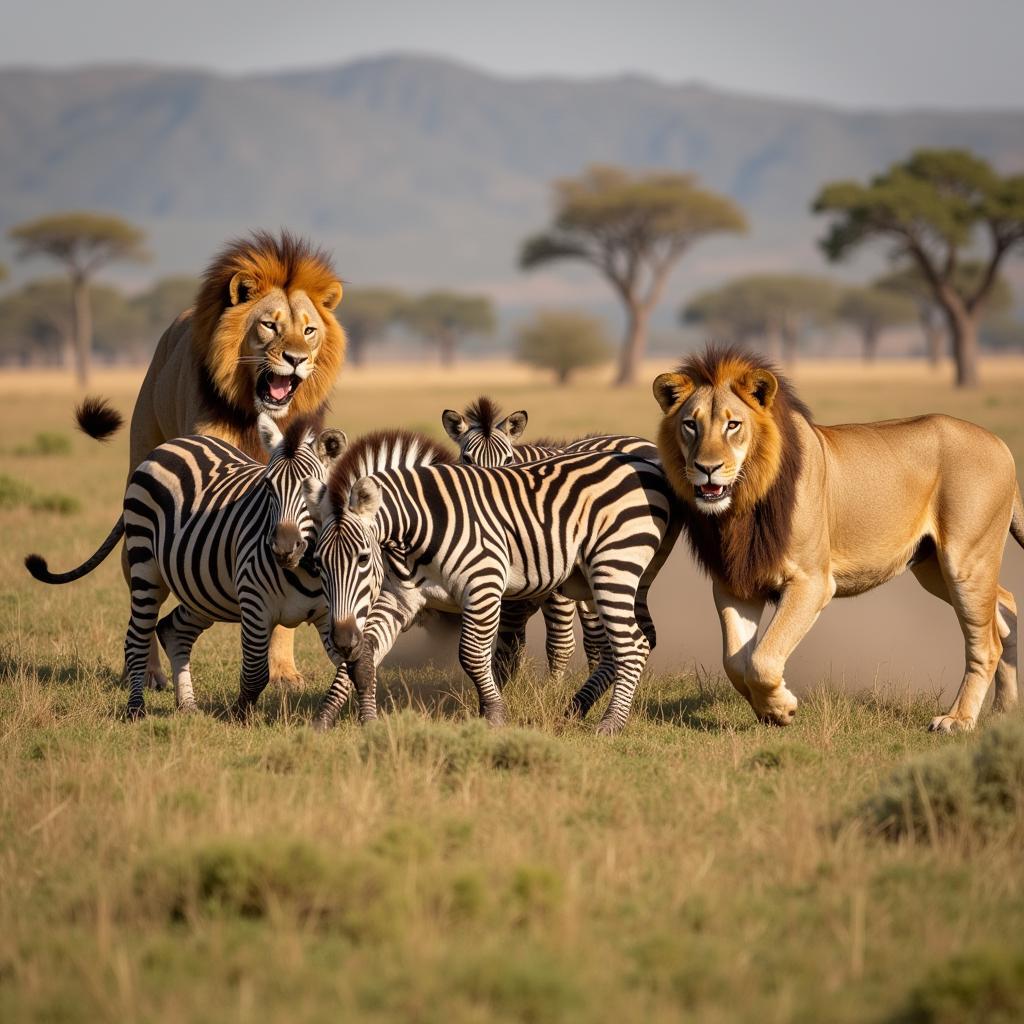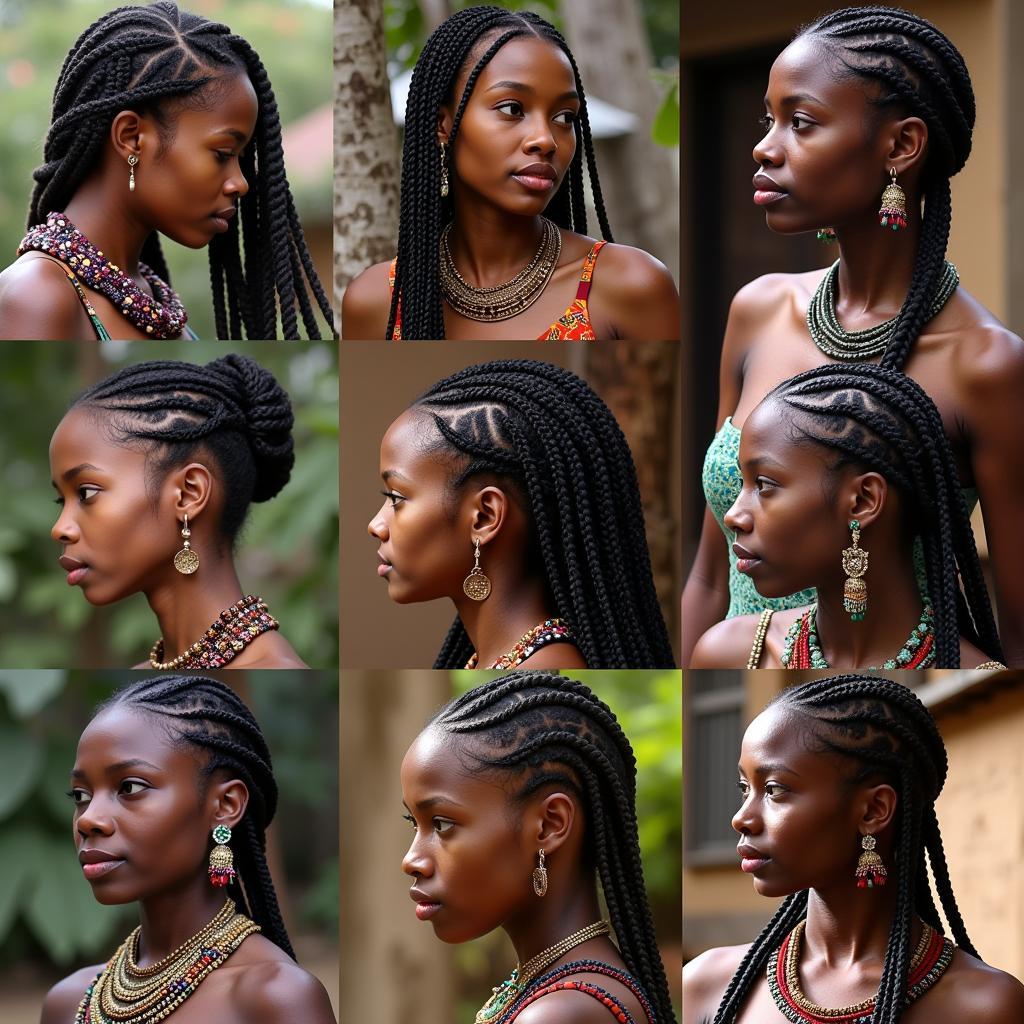Majestic South African Lion: King of the African Savanna
The South African Lion, a symbol of power and majesty, reigns supreme in the savannas and grasslands of southern Africa. This subspecies of lion, Panthera leo melanochaita, faces numerous challenges in the 21st century, making understanding their life, habits, and conservation crucial. This article delves into the fascinating world of the South African lion, exploring its unique characteristics, the threats it faces, and the ongoing efforts to protect this iconic predator. If you’re interested in African Boerboel puppies, check out this informative article.
The Physical Prowess of the South African Lion
South African lions are easily recognizable by their tawny coats and impressive manes, though the mane’s color and fullness can vary significantly among individuals and across different regions. Males are typically larger than females, weighing up to 250 kg, while females reach around 180 kg. Their powerful build, sharp claws, and strong jaws make them formidable hunters, capable of taking down large prey such as zebras, wildebeest, and even buffalo. Social animals, they live in prides, usually consisting of related females, their cubs, and a coalition of males. This social structure plays a vital role in hunting, defense, and raising young. These majestic creatures are truly a marvel of nature, perfectly adapted to their environment.
 South African Lion Pride Hunting Zebras on the Savanna
South African Lion Pride Hunting Zebras on the Savanna
Habitat and Distribution: Where Does the South African Lion Roam?
Historically, South African lions roamed freely across a vast range encompassing most of southern Africa. Today, their distribution is more fragmented, primarily concentrated in protected areas like Kruger National Park and Kgalagadi Transfrontier Park. Outside these protected havens, they face increasing pressure from human encroachment and habitat loss. While some private game reserves contribute significantly to their conservation, maintaining genetic diversity and connectivity between these isolated populations remains a challenge.
What are the primary threats facing the South African lion? Habitat loss, human-wildlife conflict, and illegal hunting are among the most pressing concerns.
Conservation Efforts: Protecting the King
Numerous organizations and initiatives are dedicated to protecting the South African lion. These efforts focus on mitigating human-wildlife conflict, combating poaching, and promoting sustainable co-existence between lions and local communities. Research plays a crucial role in understanding lion behavior, population dynamics, and the impact of conservation strategies. Educating local communities about the importance of lion conservation is equally vital, fostering a sense of ownership and responsibility for their long-term survival. Learn more about how much 70 million South African Rand is in Rupees.
The Cultural Significance of the South African Lion
Across Africa, the lion holds deep cultural significance, often symbolizing strength, courage, and royalty. In many traditional African societies, the lion features prominently in folklore, myths, and rituals. Its image adorns art, clothing, and even currency, reflecting its enduring importance in the cultural landscape. Preserving the South African lion isn’t just about protecting a species; it’s about safeguarding a vital part of Africa’s rich cultural heritage. Would you like to know about 100 million South African Rand to Dollar? This article provides valuable insights.
The Future of the South African Lion
The future of the South African lion hinges on continued conservation efforts, effective management of protected areas, and the active participation of local communities. By working together, we can ensure that this magnificent creature continues to roam the African savanna for generations to come. Interested in the financial landscape of South Africa? Find out about 1.47 of South Africans planning to invest in cryptocurrencies.
Conclusion
The South African lion stands as a symbol of Africa’s wild beauty and its diverse ecosystem. Understanding the challenges facing this majestic predator and the ongoing conservation efforts is crucial for its continued survival. By supporting conservation initiatives and raising awareness about its plight, we can contribute to securing a future where the South African lion continues to reign as king of the African savanna. For information on 52 million South African Rands in Rupees, check this helpful resource.
FAQ
- What is the average lifespan of a South African lion? Wild lions typically live for 10-14 years.
- What is the social structure of a lion pride? Prides consist of related females, their cubs, and a coalition of males.
- How many South African lions are left in the wild? Estimates vary, but the population is considered vulnerable.
- What are the main threats to South African lions? Habitat loss, human-wildlife conflict, and poaching.
- How can I contribute to South African lion conservation? Support reputable organizations working in lion conservation.
- What is the role of South African lions in the ecosystem? They are apex predators, playing a vital role in regulating prey populations.
- What is being done to protect South African lions? Conservation efforts include anti-poaching patrols, community outreach programs, and habitat restoration.
Scenarios and common questions:
Scenario: A tourist encounters a lion while on safari.
Question: What should they do? Remain calm, stay inside the vehicle, and follow the guide’s instructions.
Scenario: A farmer’s livestock is attacked by a lion.
Question: What resources are available to address human-wildlife conflict? Some organizations offer compensation programs and strategies for mitigating conflict.
Other related articles and questions:
- What is the difference between the South African lion and other lion subspecies?
- What are the latest research findings on South African lion behavior and ecology?
- How does climate change affect South African lion populations?
Need assistance? Contact us 24/7: Phone: +255768904061, Email: kaka.mag@gmail.com, or visit us at Mbarali DC Mawindi, Kangaga, Tanzania.

